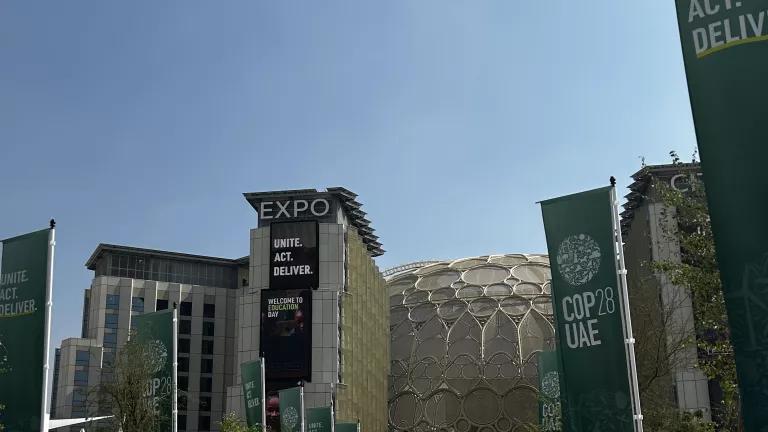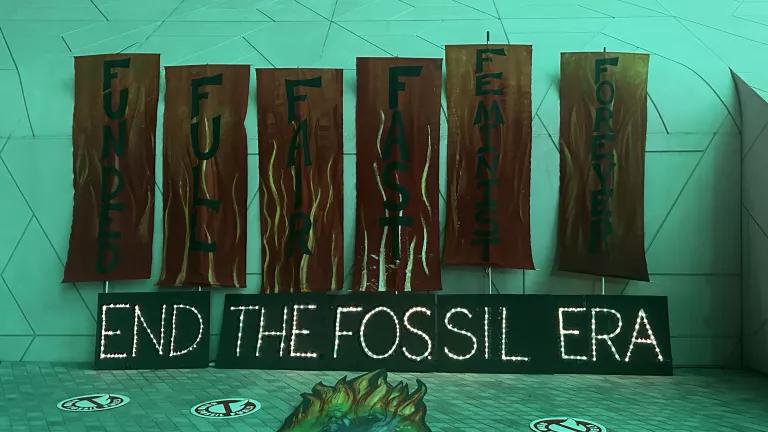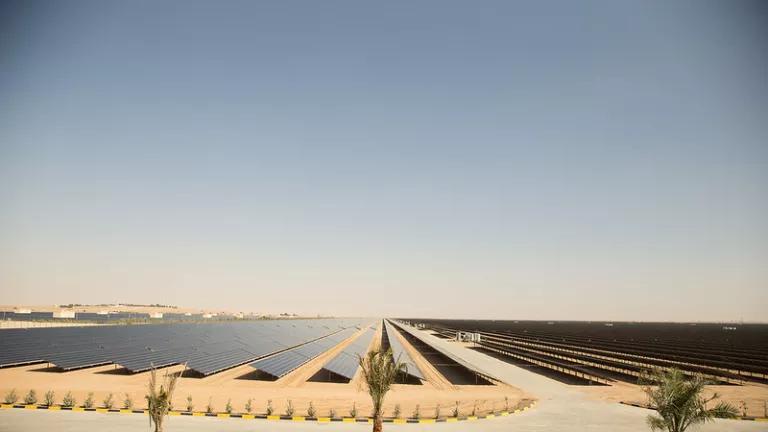Gearing Up for an Even Bigger Climate Fight in New York
NRDC is preparing for the New York State legislative session in 2023, where we'll fight hard alongside our allies and partners for important bills that will protect our state and our planet from the worst effects of climate change.
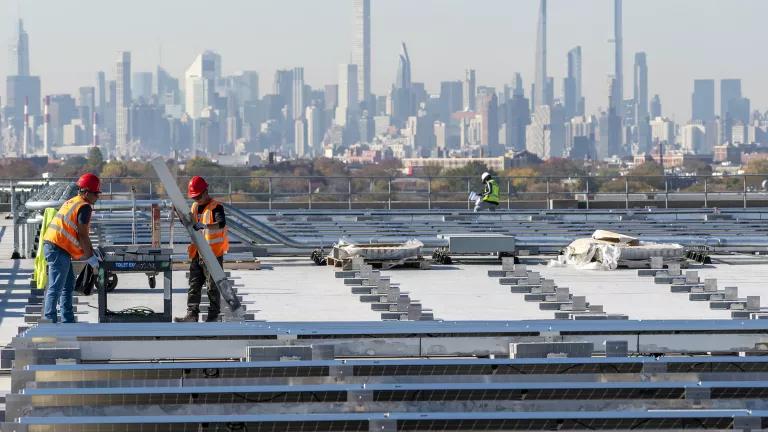
Electricians with IBEW Local 3 installing solar panels at LaGuardia Airport in Queens, New York City.
New York State made big strides for the environment in our 2022 legislative session—which we recap here. In this session, which ran from January through June, we passed bills to protect environmental justice communities on the front lines of pollution burdens, to reduce our carbon footprint by making products and buildings more energy efficient, and we dedicated significant funding for ambitious environmental projects.
But the fight is far from over. Climate catastrophe is not an abstract or future problem; its impacts, felt in the form of heat waves and intense storms, are already hitting New Yorkers across the state, falling disproportionately on low-income communities and communities of color. And the time we have left to change course and save our planet is finite and quickly running out.
With climate action being thwarted at the national level, it has never been more urgent that states take decisive action. New York has proven itself to be a climate leader—in 2019, we passed the nation-leading Climate Leadership and Community Protection Act—and we must continue passing public policies that protect the climate, our state’s natural environment, and our neighbors’ health.
Though the last New York State legislative session just ended, we’re already gearing up for next session, which begins in January 2023.
Our upcoming priorities include:
Eliminating tax incentives for the fossil fuel industry
The U.N.’s Intergovernmental Panel on Climate Change warns that the climate crisis is widespread, rapid, and intensifying. Yet despite this urgency, and despite New York’s commitment to mitigating the climate crisis, our state still spends $1.6 billion every year to exempt fossil fuel companies from paying certain taxes. In short, we are incentivizing the very industry that drives the climate crisis. The Fossil Fuel Subsidy Elimination Act would put a necessary end to many of these tax breaks, saving taxpayer money and aligning our spending with our state’s established climate goals. Read more about ending fossil fuel tax subsidies.
Electrifying buildings
Burning fossil fuels for heating, hot water, and cooking in buildings produces a significant amount of greenhouse gas emissions. In fact, buildings account for the largest portion, more than one-third, of all of New York’s statewide greenhouse gas emissions—more than transportation or electricity generation. The All-Electric (New) Buildings Act would require that starting in 2024, new buildings smaller than seven stories, and in starting in 2027, all buildings seven stories and taller, be constructed to be all-electric—meaning they would not be powered by any fossil fuels. Read more about all-electric buildings.
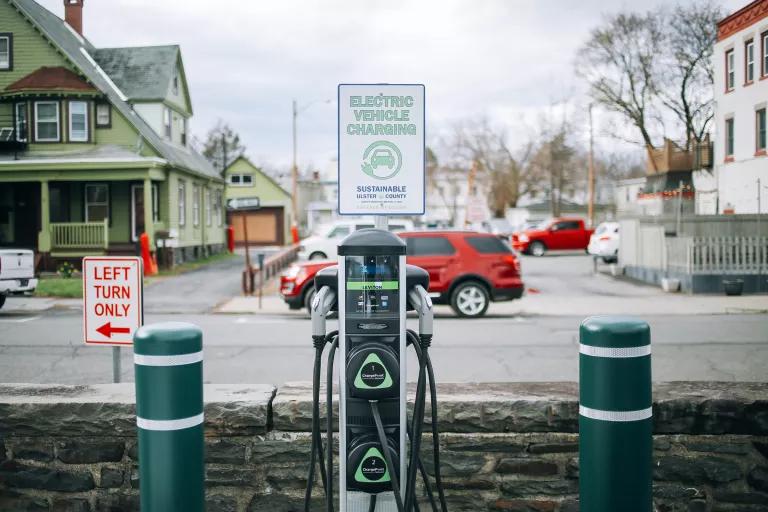
An electric vehicle charging station in Kingston, New York.
Increasing the direct sales of electric vehicles
Transportation is the largest source of greenhouse gas emissions in the state—so increasing the number of clean vehicles on the road is critical to reducing our greenhouse gas emissions and limiting climate change. Right now, state law only allows electric vehicles to be sold in five locations and by just one manufacturer. A bill we’re advocating for would lift that cap, allowing electric vehicle manufacturers like Rivian, Lucid Motors, and Tesla to sell their clean cars to drivers across New York State. Read more about electric vehicle sales.
Preventing forest degradation
Global tropical and boreal forests are some of the world’s most vital ecosystems; known as the “lungs of the planet,” they are critical to avoiding catastrophic climate change and preventing the loss of countless species. However, irreplaceable intact forests are being clearcut by the minute to feed demand for lumber, toilet paper, and other wood products, and to make space for the industrial-scale production of agricultural commodities that are imported to places including the U.S. The Deforestation-Free Procurement Act ensures the products that New York State buys do not contribute to tropical or boreal deforestation or intact forest degradation and do not come at the expense of Indigenous Peoples’ internationally recognized rights. Read more about the Deforestation-Free Procurement Act.
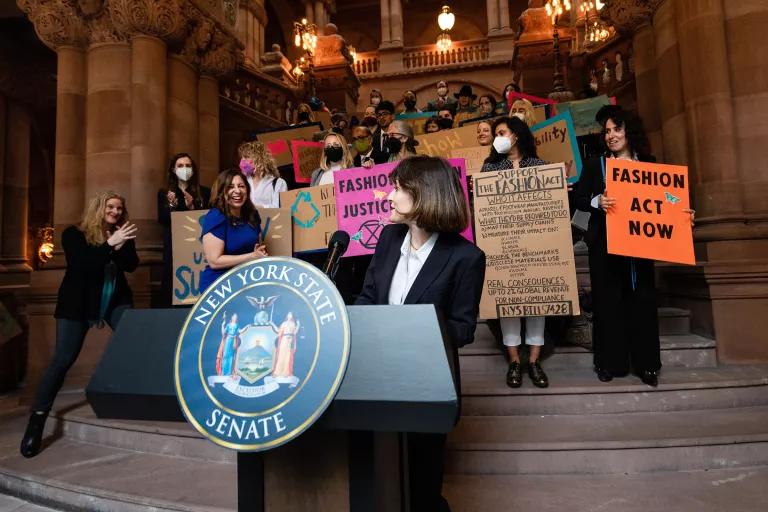
Maxine Bedát of New Standards Institute rallies a crowd of activists and New York State assembly members in Albany in support of the Fashion Act.
Designing a more sustainable fashion industry
The fashion industry is an enormous, $2.5 trillion global industry with massive environmental and social impacts. Fashion’s complicated, multinational supply chain accounts for up to 8 percent of global greenhouse gas emissions, is hugely water-intensive, uses chemicals that pollute waterways, and fills landfills with mountains of waste. And yet, the industry is almost entirely unregulated, subject to almost no oversight anywhere in the world. The Fashion Sustainability and Social Accountability Act would be a first-of-its-kind regulation over the industry, requiring fashion manufacturers and retailers to identify and publicize their environmental, climate, and social impacts, and set targets to reduce their harmful impacts. Read more about the Fashion Act.
Banking on the financial services industry to mitigate climate risk
The financial services industry, which underwrite the oil and gas industry, has the unique opportunity to play a critical role in reversing the most salient cause of climate change: the fossil fuel sector. But they have not done so and in fact, between 2016 and 2020, the world’s 60 largest private sector banks funneled nearly $4 trillion into fossil fuel projects. Next session, we will push New York to consider legislation that would require the financial services industry to bring its policies in line with New York’s Climate Leadership and Community Protection Act (CLCPA), which requires that the state achieve a 70% renewable energy grid by 2030, 100% zero-emission electricity sector by 2040, a 40% reduction of greenhouse gas emissions by 2030 and an 85% reduction by 2050. This new legislation would require financial services companies to disclose their investments in fossil fuel companies and projects and commit to aligning their risks and investments with CLCPA metrics by reducing these investments. Read more about the link between banking and climate risks.
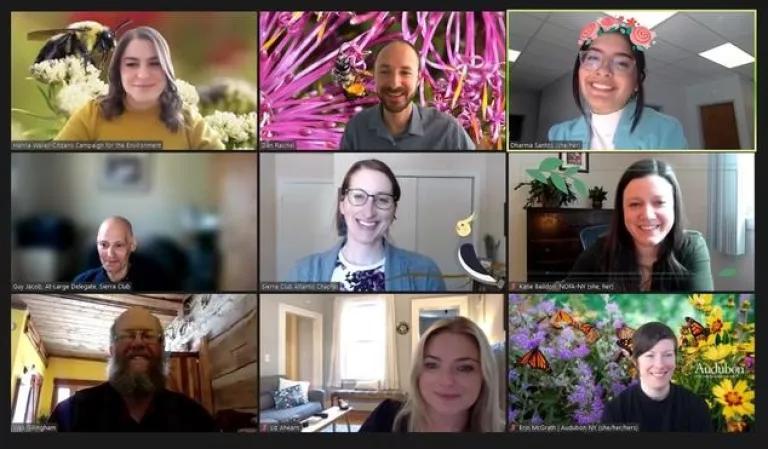
Advocates from public health, farming, and environmental groups created a buzz about the Birds and Bees Protection Act during a virtual lobby day on February 9, 2022.
Protecting pollinators from pesticides
Neonicotinoid pesticides (“neonics”) are the world’s most widely used insecticides—from lawns and gardens to corn and soybean fields—and the most ecologically destructive pesticides since DDT. Neonics have been linked to mass losses of bees, birds, and fish; they broadly contaminate New York’s water, soil, and plants; and they are increasingly raising alarms from health experts on their threats to New Yorkers’ health. The Birds and Bees Protection Act would prohibit the low-to-no benefit uses of these dangerous chemicals, providing a targeted, science-based approach to cleaning up neonic pollution that would benefit New York’s agricultural economy, ecosystems, and public health. Read more about protecting birds, bees, and human health.
In summary, our goals for next session center around climate—the most urgent, existential, far-reaching threat our world has ever faced. There is no simple solution; addressing the climate crisis requires action across industries, across the public and private sector, and on multiple fronts. The NRDC New York team is preparing to fight hard alongside our allies and partners next session for these and other important bills that would weave together solutions from across industries and sectors to protect our state and our planet from the worst effects of climate change.


